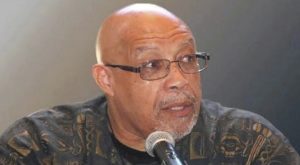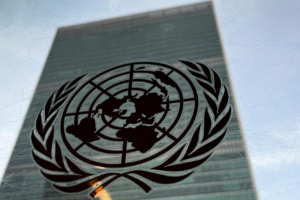Every Tuesday evening, Hannah Choi jumps online to join two-dozen high school students for lessons in advocacy.
They are all interns with BIPOC [biracial, indigenous, people of color] Montgomery County Green New Deal, a program created by the nonprofit National Institute for Peer Support, which organizes the weekly training workshops. It’s here where Choi and her peers learn to strategize to advance the environmental and social change they want to see.
“Overall, it has inspired me to become more politically active in my community, and more aware of what’s going on, that I can make change with my actions,” she said.
Jim Driscoll is president of the non-profit and a veteran climate activist who began the internship program in 2021 and serves as its coordinator. “As a first step we decided to hire a group of interns from local high schools to educate them about the climate crisis and to help build our relationships within and across our BIPOC priority communities,” he said.
The Climate Emergency Fund, a national organization, and various Maryland faith-based and environmental groups have contributed $75,000 to train and pay the 150 interns who have engaged in the program.
Interns partner for change
During the Tuesday meetings students are introduced to leaders of non-profits, immigrant, labor and environmental groups, and encouraged to partner with them. They are also taught the basics of lobbying, and how to write letters to local and state officials, testify at hearings, and take their message into social media and the street as part of non-violent protests organized by the interns and their partners.
Choi, a senior at Winston Churchill High School in Potomac, was among the first interns, and has grown with the program. Over three years she has advocated at rallies for the Green New Deal, called for electric buses at the Montgomery County Board of Education, and helped coordinate support for rent stabilization and social housing in the county.
Shortly after Watkins Mill High School sophomore Tracy Espinoza joined a year ago, she testified before the Montgomery County Council on the rental bill with a story about a friend’s struggle for affordable housing.
“She constantly had to move around. It was hard for her, to build up a new life every single time she moved,” Espinoza told council members.
Choi says going door-to-door in Gaithersburg alongside volunteers with the non-profit Everyday Canvassing, she heard similar tales.
“There were people who said that the rent prices had doubled, that they couldn’t keep up with them and [feared] they would be homeless,” she said. “And, just hearing those stories continuously, a mother and a veteran, they made me aware of how important the issues we are fighting for [are].”
Youth take seat at the table
Twenty organizations signed on to an intern-initiated letter on rent control. The students claimed victory when the Montgomery County Council voted to cap rents at 6% in 2023.
“The interns were a very popular addition to the campaign and made a significant contribution to its success,” Driscoll said. “This BIPOC internship has also helped move the local climate movement from relatively isolated, political weakness to greater connection with the BIPOC, youth and labor communities in a diverse coalition committed to social housing, an important climate objective.”
Choi has taken her new activism to the Maryland General Assembly, where twice this session she has served as page. It’s where she met Del. Vaughn Stewart (D-Montgomery), sponsor of House Bill 7, a bill that would create a pilot program for mixed-income social housing, which Choi stepped up to support.
“I think that it’s the first time I’ve ever seen it done, where someone is serving as page, and then simultaneously, they take their page hat off and put on their advocacy hat to testify,” Stewart said. “People were impressed that she was there. It made a big difference.”
The bill subsequently crossed over to the Senate with bipartisan support.
Junee Kim, like Espinosa, is a sophomore at Watkins Mill, in Gaithersburg. She credits the internship with broadening her network to include other student groups like Young People for Progress, whose constituency is youth under 35. Kim started the first YPP high school chapter at Watkins Mill, and was elected president of the larger organization, and its outreach and campaign chair, with Espinoza at her side as vice president and policy director.
“We generally focus on policing, restorative justice in high schools [and the] school-to-prison pipeline.” Kim said. “I testified [before] the Montgomery County Board of Education to fund restorative justice coaches in every high school, [and am] currently advocating [for] a restorative justice survey for the school system.”
Advocacy strengthens democracy, sense of self
Kim, Choi and Espinoza are first generation Americans, daughters of immigrants. Kim says the internship has turned her from a retiring, soft-spoken person into a young woman who is unafraid to speak her mind, and comfortable listening to views unlike her own. “This has made me so much more confident,” she said.
Choi says the process has made her more open minded. “I think that we all need to step back and try listening from other perspectives, try any opportunity to become as informed as you can be, just because that’s really important in our democracy,” she said.
Espinoza adds that young people are also in a fight for their future, that action today has consequences. “Being part of this really taught me how to advocate for myself, how to standup for myself, how to find my voice and the importance of using my voice,” she said. “I learned I love getting involved with public policy. I found my passion within government. And that is something I hope to continue as long as I can and hope to pursue it.”
At a recent Tuesday meeting interns were busy planning their next action, a protest rally scheduled for April 23, at the Montgomery County Public Schools Board of Education in Rockville. There they will argue their case for the school system to recommit to purchasing only electric school buses.
“Recent developments have seen MCPS revert to purchasing diesel buses, which pose significant health risks and contribute to climate and environmental harms,” an internship online petition says.




